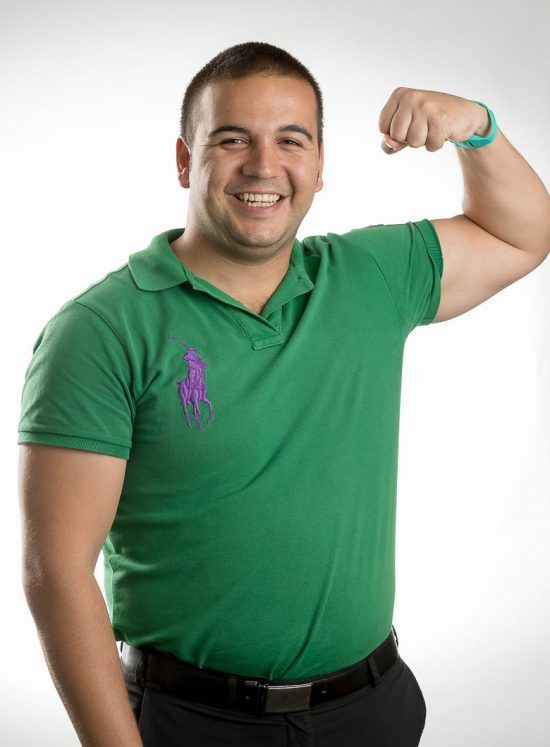Jack Tyrrell is the Accessible Solutions Profiler at digital accessibility advocates, Media Access Australia. He’s a passionate and driven young man who literally lives his work. That’s because Jack is legally blind and relies on technology and the support of MAA to access online and digital communications. He shares his story in a very revealing podcast article.

Jack Tyrrell flexes a bicep
Listen to a podcast (or read the short article) featuring MAA’s Jack Tyrrell, interviewed by fellow staff member Philip Jenkinson, about coping with blindness and his love for the job of promoting web and digital accessibility to organisations all across Australia.
Read the transcript of Philip Jenkinson interviews Jack Tyrrell
On Melbourne Cup weekend 2012, Jack Tyrrell lost his eyesight. It happened pretty much overnight, and he went from being an active sports-loving guy who played cricket, footy and 9 holes of golf on a regular basis, to being one of the 20% of Australians with a disability.
The condition Jack has is called ‘Leber’s hereditary optic neuropathy’ (LHON) and unfortunately it impacts his central vision and can’t be treated. So as a legally blind person, that means Jack has to rely on technology to help him carry out his work, find his way around, catch a bus, buy lunch, and of course, go online to browse services, purchase things or access information.
Jack’s story is one of ability in action, overcoming obstacles, and actively advocating to make a real difference in the lives of people with a disability, within the web and digital space, thanks to accessible technology.
“A the age of 20 it was hard to take many things too seriously,” says Jack Tyrrell. “I was trying to just go with the moment, and continue living life normally. And it just happened that six months ago, it really hit me, like a ton of bricks I guess you’d say, to get over that hurdle. And now, after understanding the condition, and understanding my limitations on what I can do, I really feel more comfortable living the lifestyle of someone who is legally blind.”
So what does he like most about working at Media Access Australia?
“Well, the thing I’m passionate about is how important it is for people like me to have access to information and how critical it is, just to perform basic tasks, like, everyone takes for granted, like booking a flight or booking a hotel,” Jack says. “If it’s not accessible, I can’t do it.”
Jack is often on the phone chatting to people in government departments, education providers, not for profits and companies big and small. So what are the big issues he hears about and what advice does he have to give them?
“One of the things I’m speaking to them about is, are they actually fulfilling their obligations as an organisation, and are they producing PDFs and their website and other materials in a format where people like myself, with a disability, 20% of our population, are able to access the information?” says Jack. “It’s not just fulfilling their obligations, but these organisations could actually maximise their digital reach by providing this content in an accessible format.”
If your organisation is interested in ensuring that what you do online and via your digital comms is accessible to people who are blind or vision-impaired, Deaf or hearing impaired, or who have a cognitive condition, you can contact the digital access solutions team at Media Access Australia. MAA can assist with usability testing, web access audits, digital accessibility maturity assessments, document remediation, accessibility training and more.
You can also subscribe to the fortnightly MAA newsletter by filling out your name and email address in the ‘Get our Free Newsletter’ panel on the home page.
